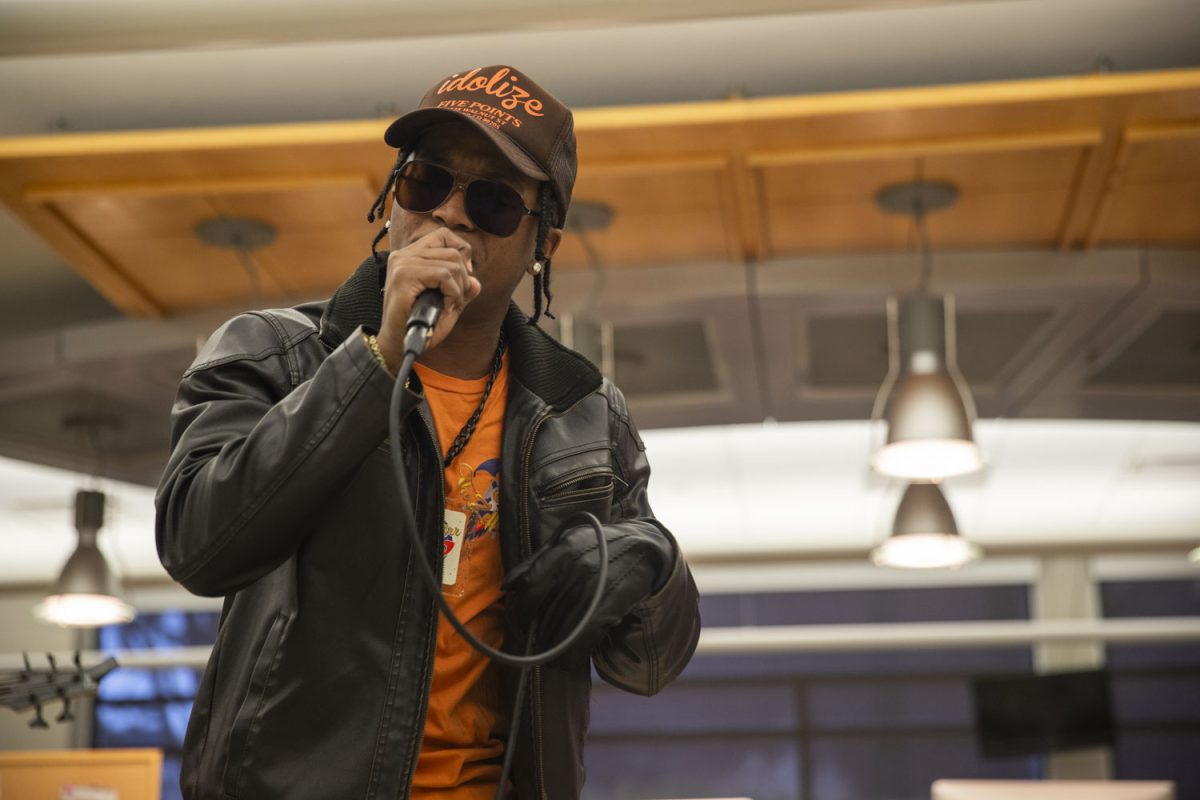
Tin cans, glass containers, and a cardboard box provide targets for University of Iowa percussion graduate student Andrew Thierauf’s mallets. As microphones amplify the various sounds, he directs a room full of composers tapping on laptops.
"To begin, everyone press space bar," Thierauf said. "Next, press 1 all-together."
With instructions that could easily be mistaken for cheat codes to a computer game, this unconventional ensemble commences a musical arrangement. The UI Laptop Orchestra will perform its original piece at 8 p.m. Friday in the University Capitol Center Recital Hall.
Laptop Orchestra research assistant and event host Jason Palamara said the orchestra rehearses while sitting in a half-moon shape similar to other ensembles. The only difference is its musical instrument of choice is a laptop.
"There are two elements to the process," Palamara said. "There’s the playing music part, and then there’s building some kind of technology or software that will play the music."
From electronic music of the 20th century to the more recent explosion of techno music on the radio, today’s society is familiar with the incorporation of laptops and technology in the creation of songs. Director of the UI School of Music Dave Gier said technology has positively affected the ease with which people can access and share music, making the laptop a great tool for musicians.
And though a small percentage of composers have specialized in electronic music since computers were able to spit out audio signals, they rarely dabble in classical genres
"There’s been sort of a separation between the traditional composer and the electronic composer," said David Gompper, director of the Laptop Orchestra. "We’re trying to bridge that gap."
With the variety of music a laptop can offer, bridging that gap isn’t a terrible feat, said Laptop Orchestra member Jonah Elrod. Unlike acoustic instruments, which require a great deal of training and education, laptops are fairly unrefined.
"With a computer, I can create my own system or performance practice very quickly," Elrod said. "I can have a musician behind a computer, and they don’t have to read music, have muscle memory, or any of that stuff that’s associated with acoustics. They can just follow my instructions and recreate my intentions."
Elrod and Gompper said the upcoming performance is guaranteed to include an acoustic instrument with a computer-altered sound, blending the two orchestral worlds in one seamless piece.
Although the innovation of technology in music is not a rarity for today’s generation, or even the previous, some find it hard to accept the laptop as a legitimate instrument, with the machine’s musical capabilities often thought to be limited to managing sound levels backstage at concerts and mixing dubstep beats in the studio.
But Palamara said the laptop orchestra aims to get away from the idea that "laptop players" are workers rather than musicians.
"We’re trying to push the envelope," he said. "We’re not just in the audience pushing buttons where no one knows what we’re doing. We’re up on stage, on which everyone can see what we’re doing."
Gier agrees about the opportunities presented when musicians broaden their definitions of instruments to include laptops.
"It brings interdisciplinary possibilities," he said. "For example, if an engineer major wanted to be in the orchestra, he could easily collaborate with a laptop musician on a piece, and that’s something that not all instruments can provide."
Despite the many benefits, there are some challenges in taking the stage with only a laptop. The speakers installed in this particular instrument are directional and usually leave the audience confused about where each sound is coming from.
"It looks like everyone is checking their emails on stage," Gompper said and laughed. "I guess that’s the downside of it.
"While this presents a quandary traditional orchestras don’t have to face, the laptop orchestra has spiced up its show by constructing hemispherical speakers under the performers to radiate sound in all directions," Elrod said.
These speakers make it easier to tell who is playing what, but he still likes the challenge of impressing an audience.
"I would encourage people to just embrace the newness of it and say, ‘Wow, the person sitting behind that computer created this,’ " Elrod said. "There’s no Beethoven or dead composer long gone. We’re alive, and we’re doing it."
This sense of "happening in the moment" and the idea of creating original work is exactly what the laptop orchestra hopes to bring back. Gompper said he aspires to reconnect the art of performing and composing specifically.
"Beethoven, Mozart – they were all performers," Gompper said. "Oh yeah, and by the way, they were composers too. The laptop orchestra gives the opportunity for composers to also become musicians and practice the art."
Along with reviving the art of being both sides of a musician — the writer and the executer — the UI Laptop Orchestra aims to bring the laptop to the level of the piano, violin, cello, and other acoustic instruments. Though the members admit to having a long way to go, Elrod said, their goal definitely isn’t impossible in today’s world.
"Someone once said to me, ‘You can’t be a virtuoso on a laptop,’ and I responded ‘why not?’ "
Palamara said. "That ‘why not’ is what we’re trying to figure out."
From Data to Sound, a performance by the UI Laptop Orchestra






